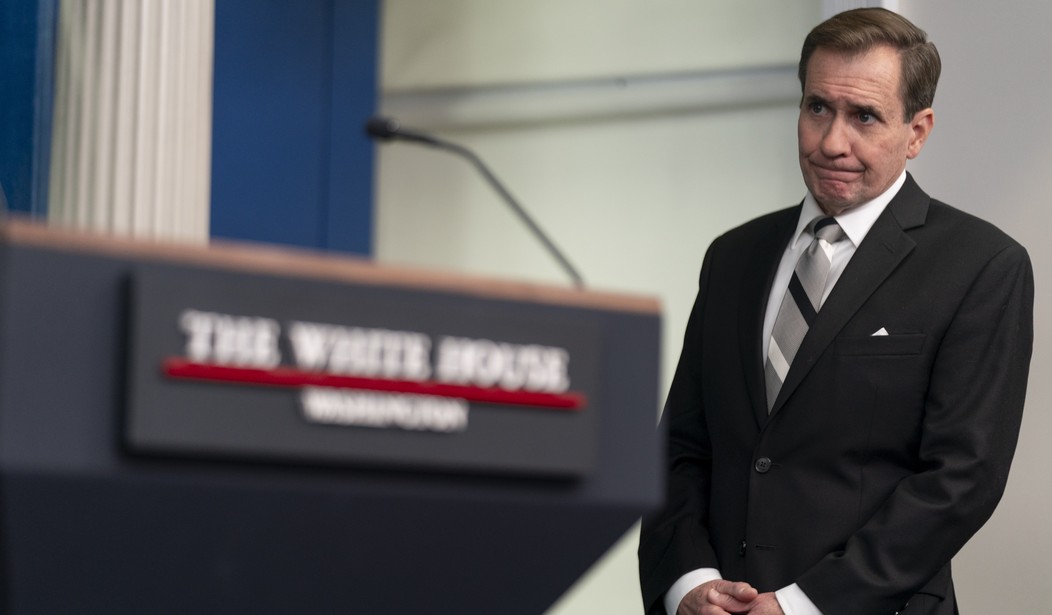Earlier on Monday, the the United States failed to veto a resolution from the United Nations Security Council on Monday calling for an immediate ceasefire in the Israel-Hamas conflict. As Matt covered, Israeli Prime Minister Benjamin Netanyahu canceled a diplomatic visit to the White House that was supposed to take place later this week, which the White House sees "as an artificial crisis manufactured." White House National Security Communications Advisor John Kirby used to be better on the Israel-Hamas conflict, but as Matt predicted would have to happen at some point, that honeymoon period is over. This is especially as Kirby's answers from Monday's White House press briefing don't help the situation.
In his opening statement, Kirby claimed that the abstention "does not represent a shift in our policy," and actually even tried to spin it as a pro-Israel move. "We wanted to get to a place where we could support this resolution. But because the final text does not have key language that we think is essential, such as condemning Hamas, we couldn’t support it. Though because it does fairly reflect our view that a ceasefire and the release of hostages come together, we abstained," he offered.
Kirby claims abstaining from U.N. vote today does NOT signal a shift in the Biden admin's policy toward Israel. pic.twitter.com/mFKKC8wx2n
— Townhall.com (@townhallcom) March 25, 2024
Throughout the briefing, Kirby was asked question after question about the resolution and Netanyahu's decision. He actually claimed to be "kind of perplexed" by how the prime minister called off the delegation, as he then tried to downplay the significance of the resolution, since "it’s a nonbinding resolution" and "there’s no impact at all on Israel and Israel’s ability to continue to go after Hamas." Kirby also repeated that the abstention "does not represent a change at all in our policy" and is "very consistent with everything that we’ve been saying we want to get done here."
Kirby also offered the view of how "it seems like the prime minister’s office is choosing to create a perception of daylight here when they don’t need to do that."
Recommended
As another reporter tried to point out that "the perception broadly is that the U.S. has no longer got Israel’s back when it comes to conversations like this with the U.N.," Kirby shot back that "nothing could be further from the truth, quite frankly," claiming "of course, we still have Israel’s back," adding there's "no change by this nonbinding resolution."
KIRBY: "Of course we still have Israel's back...no change by this non-binding resolution." pic.twitter.com/Xb7QhvUFkg
— Townhall.com (@townhallcom) March 25, 2024
Blaise Misztal, the Jewish Institute for National Security of America (JINSA) provided a statement to Townhall offering another view. "Neither U.S. nor Israeli interests are served by further strain put on the U.S.-Israel relationship by the Biden administration’s decision to allow the passage of a UN Security Council resolution that called for an immediate ceasefire in Gaza without first requiring Hamas to release the hostages it has held for nearly six months and Prime Minister Netanyahu’s subsequent cancellation of a high-level delegation to Washington," he noted.
Kirby scoffed at another question from a reporter who dared to point out that for all this "domestic political pressure" the White House believes Netanyahu is facing, President Joe Biden is facing his own pressure. "Aren’t there also domestic political pressures facing President Biden, and that’s part of the reason why you all are allowing this to happen today," CBS News' Ed O'Keefe asked.
When O'Keefe pointed out that "you’ve got members of the Democratic Party saying he’s doing this wrong, you’ve got the general public suggesting his support for Israel is misplaced," and asked "is that part of why this is going through today," Kirby became visibly annoyed.
"No. No, absolutely not. And I got to take issue with the premise of the question," Kirby insisted. "The president makes decisions based on the national security interests of the United States. And this decision to abstain on this resolution is in keeping with the national security interests of the United States. And, quite frankly, it’s in keeping with the national security concerns of the Israeli people," he went on to say, expressing what he believes is best for the people of a foreign nation.
Great questions from CBS’s @EdOKeefe.
— Curtis Houck (@CurtisHouck) March 25, 2024
O’Keefe: “There are U.S. officials today saying Netanyahu's acting this way because he's facing some domestic political pressure — there's domestic political issues going on. Aren't there also domestic political pressures facing President… pic.twitter.com/YCrercbsQG
Aanother reporter asked "how would you characterize the relationship in specific between Netanyahu and President Biden since he didn’t call President Biden to notify him about the cancellation of this delegation visit?" The reporter went on to ask "is their relationship at a new low?"
Kirby claimed "I wouldn’t describe it that way at all," despite there being plenty of evidence that it could be. He became impatient as he insisted "I--I don’t really have much more to add," speaking to how he's gotten this question before. Perhaps that would be as the president and Democrats continue to look to undermine Netanyahu?
"These are two leaders who have known each other for going on, now, four decades. And they--they haven’t, in the past, agreed on everything, and they don’t agree on everything right now," Kirby offered, which would be a polite way of describing the relationship. "But they both agree on one really important thing, and that is the importance of the State of Israel, the importance of the security of Israeli people, the importance of making sure that an attack like the 7th of October doesn’t happen again," Kirby went on to offer.
REPORTER: How would you characterize the relationship between Netanyahu and Biden? Is their relationship "at a new low"?
— Townhall.com (@townhallcom) March 25, 2024
KIRBY: I wouldn't describe it that way at all. pic.twitter.com/GiUMCUctbQ
Such a response is curious given what took place on Monday, but also how the Obama-Biden administration looked to get involved in ousting Netanyahu in 2015. Even more recently, Biden said that Senate Majority Leader Chuck Schumer (D-NY) gave a "good speech" when he called for Israel to hold new elections and get rid of the prime minister, claiming Netanyahu had "lost his way" and was "an obstacle to peace."
Later in the briefing, Kirby was asked about what Biden's "personal reaction to the Israeli delegation canceling their trip, given that he had personally requested that they make this trip to Washington," something he could not speak to, because he had not talked to the president, even about such a key development.
Kirby also offered no such assurances about if the United States can be counted upon to stick by Israel at the United Nations again when it comes to resolutions that would be beneficial, such as if they directly called out Hamas.
Again, Kirby looked to downplay the resolution that passed, as he called the reporter's question "pretty speculative" and said the one that passed is "a nonbinding resolution."
"I don’t know of any additional text that’s coming up before the Security Council," Kirby went on to add, "so, I don’t want to get ahead of where we are right now." Given how the UN has had a serious problem calling out Hamas before, even denying they meet the criteria for terrorists, one should likely not expect such a resolution. This makes it even more concerning that the United States didn't abstain earlier.
Tellingly, Kirby had been repeatedly confronted during the briefing about how "an administration official said there could be domestic political reasons for why Netanyahu responded in the way he did." When he was asked if he could elaborate on what those domestic issues in Israel could be," he refused to do so.
There also seems to be more of what Kirby and the administration is missing here. "Any U.S. attempts to prevent, delay, or complicate Israeli operations will neither hasten the war’s end nor bring peace; they only serve to prolong the conflict and the suffering of the Palestinians being used as human shields by Hamas," Misztal added. The Biden administration and the president himself have expressed concern for Palestinian lives.
"But the Biden administration should also recognize that Gaza is just one front in not just a regional, but a global war being waged against the United States and its partners by the Iran-Russia-China axis. Hamas and Hezbollah attacking Israel, Iraqi militias launching drones at U.S. troops, the Houthis firing missiles at international shipping, or Russia bombarding Ukraine—these are all part of one increasingly intertwined threat network supplied by Iran’s arsenal," Misztal also shared, speaking further to high supporting Israel is a national security issue. "Standing firmly by Israel, the United States can score a major victory over its adversaries and demonstrate the benefits of being an American partner; however, abandoning Israel, as the Biden administration is inching ever closer to, will only embolden Russia and Iran, convincing them that, since they can attack U.S. partners with little risk, to do so more frequently."























Join the conversation as a VIP Member